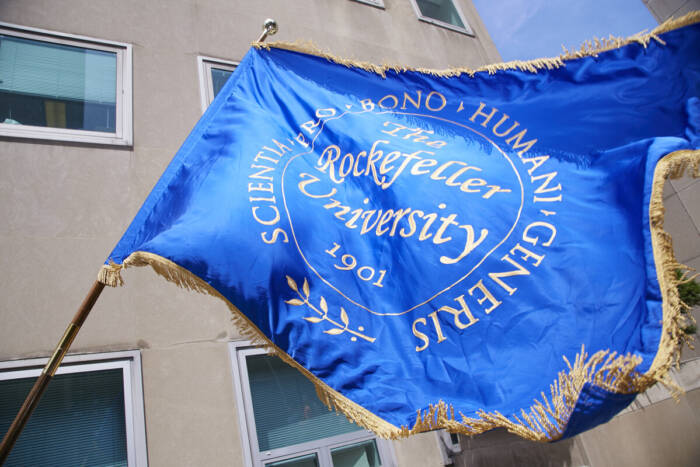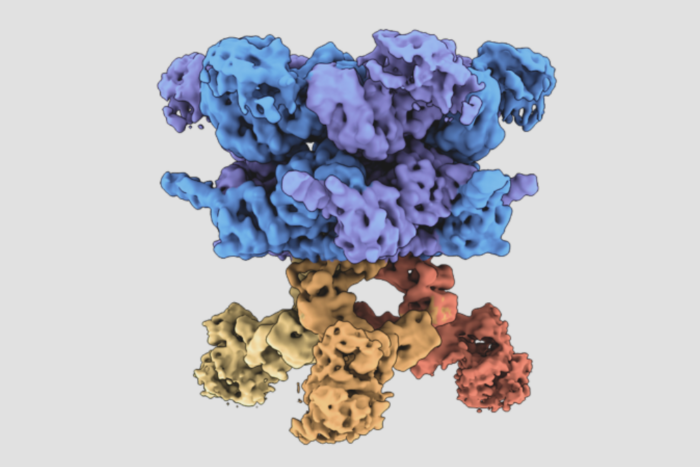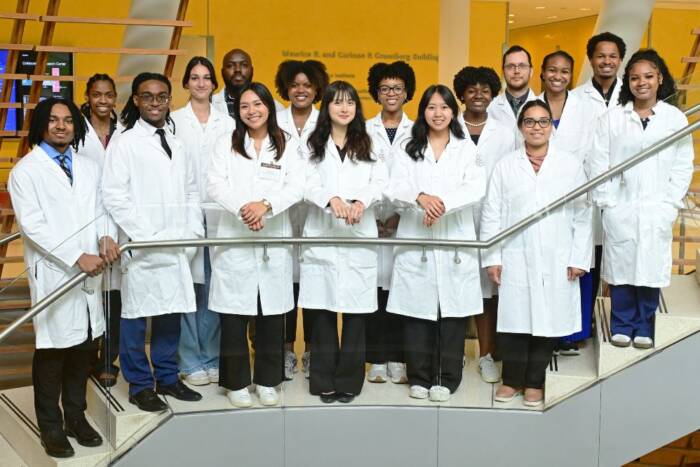Arnold J. Levine Named President of Rockefeller University
Noted Cancer Researcher Chosen to Succeed Torsten Wiesel as RU’s Eighth Leader
Dr. Arnold J. Levine, the Harry C. Wiess Professor in the Life Sciences at Princeton University and a world-renowned cancer biologist, has been elected the eighth president of The Rockefeller University. Dr. Levine was selected to succeed Dr. Torsten N. Wiesel, who will retire this fall after seven years of service as Rockefeller’s president. Dr. Levine will assume the presidency after the regularly scheduled November board of trustees meeting, following a period of transition with Dr. Wiesel.
The announcement was made by Richard M. Furlaud, who has chaired Rockefeller’s board of trustees since 1990, and by Richard B. Fisher, who will assume the post of chairman on July 1.
Dr. Levine, who has been associated with Princeton University for 25 years, is one of the world’s leading authorities on the molecular basis of cancer. In 1979, he discovered the p53 tumor suppressor protein, a molecule that inhibits tumor development. Because disruption of this protein’s normal function is associated with an estimated 60 percent of human cancers, p53 has become a focus of research in laboratories around the world and is helping to fuel the design of a new generation of anti-cancer therapies.
Dr. Levine also presided over a major expansion of Princeton’s programs in the life sciences as chairman of that university’s department of molecular biology from 1984 through 1996. During his tenure, Princeton recruited 15 scientists to the faculty, constructed two state-of-the-art facilities (the Lewis Thomas Laboratory and the George LaVie Schultz Laboratory), and refurbished the existing Guyot/Moffet Laboratories. In addition, Dr. Levine played an influential role in shaping the nation’s science priorities as chairman of a 1996 independent review panel on federal AIDS research funding.
Mr. Furlaud, Rockefeller’s chairman and the former chairman and chief executive officer of Squibb Corporation, headed the university’s presidential search committee, which unanimously recommended Dr. Levine to succeed Dr. Wiesel when he retires. “Dr. Levine embodies all of the qualities that our joint trustee/faculty committee determined as criteria for the new leader of Rockefeller,” said Mr. Furlaud. “His scientific accomplishments and his leadership contributions to Princeton and the broader community make him the ideal person to serve as Rockefeller’s new president. I have been consistently impressed by his intelligence and integrity, as well as his engaging sense of humor, and I know that the university community will benefit greatly from his presence here.”
Dr. Levine said, “It is a privilege to join The Rockefeller University during such a challenging and exciting period for this great institution, which has attained a new level of distinction during Torsten Wiesel’s administration. Rockefeller faculty members have demonstrated the mastery, creativity, and drive to make seminal contributions in many vital areas of biomedical research. I look forward to working with these remarkable scientists as the university enters its second century.”
“I can think of no one better qualified to be the next president of this university than Arnold Levine,” said Dr. Wiesel. “He is a superb investigator and academic leader whose knowledge and interests extend well beyond his own area of expertise. His vitality, personal warmth, and compassion will leave their mark on the entire university community.”
Mr. Fisher, the university’s chairman-elect and chairman of the executive committee at Morgan Stanley Dean Witter & Co., added, “Dr. Levine’s wide-ranging experience includes supervision of excellent laboratory and clinical research, direction of a large-scale academic expansion, and powerful advocacy for more effective federal science policy. I am confident that the university will continue to flourish during his presidency, just as it has under Torsten Wiesel’s inspired leadership.”
Dr. Wiesel, a neurobiologist who shared the 1981 Nobel Prize in Medicine, was appointed the university’s seventh president in 1992. He joined the Rockefeller faculty in 1983 to head a new laboratory of neurobiology, and later that year he was named the university’s Vincent and Brooke Astor Professor.
Under Dr. Wiesel’s direction, The Rockefeller University formulated and successfully implemented a strategic academic plan to enhance research and education. As a result, the university now has 78 independent laboratories, with 28 directed by newly appointed or promoted faculty members, including 16 at the rank of tenured professor. During the Wiesel administration, the university also established six interdisciplinary research centers, in the areas of human genetics, immunology, sensory neuroscience, Alzheimer’s research, chemistry, and physics. To support these centers, appointments, and related capital improvements, the university has raised $190 million in private gifts during the seven years of Dr. Wiesel’s presidency.
Dr. Arnold Levine
Arnold Levine was elected to membership in the U.S. National Academy of Sciences in 1991 and to its Institute of Medicine in 1995. Among the numerous awards he has earned are the Katharine Berkan Judd Award from Memorial-Sloan Kettering Cancer Center and the Brinker International Award from the Susan G. Komen Breast Cancer Foundation, both in 1993; the 1994 Bristol-Myers Squibb Award for Distinguished Achievement in Cancer Research; and the First Annual Strang Award from the Strang Cancer Prevention Center, also in 1994. In 1998, he has received the Paul Ehrlich and Ludwig Darmstaeder Prize from the Paul Ehrlich Foundation, the Bertner Award from the University of Texas M. D. Anderson Cancer Center, and Eli Lilly’s Clowes Award from the American Association for Cancer Research. In addition, since 1994 he has been awarded honorary degrees from the University Pierre and Marie Curie in Paris, the State University of New York (SUNY) at Binghamton, York University in England, the Mount Sinai School of Medicine, and the University of Pennsylvania, his graduate school alma mater.
Dr. Levine was born in Brooklyn in 1939. After receiving a B.A. from Harpur College, SUNY in 1961 and a Ph.D. from the University of Pennsylvania in 1966, Dr. Levine worked as a postdoctoral fellow at the California Institute of Technology. He first went to Princeton in 1968 as an assistant professor, and in 1976 became a full professor of biochemistry. In 1979, Dr. Levine left Princeton to chair the department of microbiology at SUNY Stony Brook School of Medicine. He returned to Princeton in 1984 as the Harry C. Wiess Professor and chair of the department of molecular biology.
He is currently a member of both the scientific and medical advisory boards of the Howard Hughes Medical Institute and a trustee of Cold Spring Harbor Laboratory and the University of Pennsylvania, where he is on the executive committee. He also serves on scientific advisory boards at the Memorial Sloan-Kettering Cancer Center, the Basel Biozentrum in Switzerland, the Mount Sinai Research Institute in Toronto, the Huntsman Cancer Center at the University of Utah, and the Institute for Cancer Research at Lausanne. In addition, he has been on numerous editorial boards and federal committees, and on many other advisory boards, including those of the Whitehead Institute, the New Jersey Biotechnology Institute, the Fred Hutchinson Cancer Research Center, the Cleveland Clinic, and the Albert Einstein College of Medicine.
Dr. Levine and his wife, Linda, have two daughters, Samantha and Alison.
The Rockefeller University
At Rockefeller, Dr. Levine will lead an institution with a current annual operating budget of $140 million and an endowment valued at almost $900 million. Today, the university includes nearly 475 faculty members and research staff, and about 140 Ph.D. and M.D.-Ph.D. students. The administrative, technical, and support staffs number 600.
Nineteen Nobel laureates, including two alumni, have been associated with the university. Thirty-two current faculty members are elected members of the U.S. National Academy of Sciences. Over the years, Rockefeller scientists have been responsible for many significant achievements: they discovered that DNA is the carrier of genetic information; launched the field of modern cell biology; determined that a virus can cause cancer in animals; first isolated and successfully tested an antibiotic; identified blood groups and developed techniques for preserving whole blood; and cloned the obese gene, discovering its weight-regulating hormone product, leptin.
The Rockefeller University was established by John D. Rockefeller in 1901 as The Rockefeller Institute for Medical Research. With his son John D. Rockefeller Jr. and financial adviser Frederick T. Gates, Mr. Rockefeller set about creating a place where scientists could engage in investigations that would–in accordance with the institution’s motto, Pro Bono Humani Generis–benefit humankind.
Modeled on the Institut Pasteur in Paris and the Koch Institute in Berlin, the Rockefeller Institute was the first private American center designed exclusively for biomedical investigations. With the 1910 addition of a research hospital, the first U.S. facility devoted exclusively to experimental medicine, the institute soon became a preeminent center for the apprenticeship and training of the world’s most talented young scientists. In 1954, the institute was chartered as a graduate university. Its first doctoral degrees were granted in 1959, and in 1965 the institution changed its name to The Rockefeller University.
Dr. Levine’s election by the board of trustees culminated an intensive, year-long search by the university’s presidential search committee. Members of the committee, in addition to Mr. Furlaud, its chairman, included six other trustees–Joseph L. Goldstein, Neva R. Goodwin, Philip Leder, Richard E. Salomon, Stephen Stamas, and John C. Whitehead–and five Rockefeller University professors–Jan L. Breslow, Jeffrey M. Friedman, A. James Hudspeth, John Kuriyan, and Robert G. Roeder.


